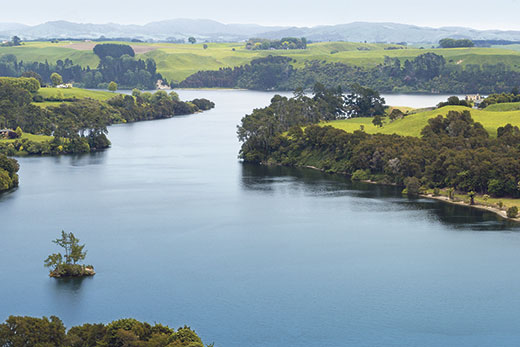After collaboratively cogitating for almost three years, the report created by the Collaborative Stakeholder for the Healthy Rivers Wai Ora project has seen the light of day.
The project is to clean up the waters of the Waikato and Waipa rivers, particularly of their current loads of sediment, e.coli, phosphorus and nitrogen.
And the group’s prognosis is it will take 80 years to achieve its goal, which is to meet the aspirations of the Vision and Strategy for the Waikato River, a legislative document created in partnership between the Government and the five river iwi. This aim is to have the two rivers swimmable everywhere, and fit for taking fish and other foods from.
Despite the long preparation timeframe, and the fact detailed information on every meeting of the group has been available on the Waikato Regional Council’s website all that time, it’s amazing just how many people – both urban and rural – are now seemingly hearing about the environmental changes it will encompass for the first time. I guess the naysayers and the ‘nimbys’ had hoped it would never appear, much less result in a significant plan change to the Waikato Regional Plan at some point.
Climate change
We hear endless reports about the future implications of climate change, the fact that much of our freshwater supplies are being polluted one way or another. The implications of an increasing population, and the effects of these on our economic stability, as a country which relies on primary produce and tourism for most of its income. And yet so many people don’t think these things have anything to do with how they live their lives.
The primary aim of the group’s report is to achieve 10 per cent of what is needed in the first 10 years. To some this appears impossibly lax, and an 80-year timeframe ridiculously long, given what climate and other hazards might throw at us in the meantime. To others, what is being required of them within this 10 years has them foaming at the mouth, screaming potential bankruptcy, and a grim determination to go on doing as they have been forever.
Having attended a number of meetings during the lifespan of the CSG, and watched the detail and level of consultation that has been involved, I’ve also been following some of the other meetings held in recent weeks, when members of the CSG have spent time explaining their reasoning, and when the report itself has been passed from CSG to Wai Ora Committee and thence to council.
Major issues
It seems to me that there are two major issues that have topped the discussions of late. The first is the recommendation that land use change – that which has the potential to make the leaching and runoff problems worse – is nipped in the bud and stopped on the day the council issues the report for public submissions. The reason for this is councils around the country have already been “caught” by wealthy groups on other issues, where expensive lawyers whip in their proposals the next day and pre-empt having to comply with the proposed changes.
The second issue is about the continuation of levels of nitrogen (urea) usage, and this is causing a rift between dairy and drystock farmers. The former are supposedly to be allowed to continue to use the amounts used in the last two years, apart from those who have been wildly overdosing, who will have to cut back.
The latter are complaining they haven’t used much, but are going to have these low levels fixed for a decade, which won’t allow them to cope with the vicissitudes of market changes that might require them to use more urea to cope with different land uses at times when sheep, beef or wool prices dive on world markets.
With local body elections looming, it behoves everyone, rural and urban, to make themselves aware of how this plan change will impact their lives and businesses, and ensure those vying for election are equally aware, with plans in mind, if not yet on paper. And they can always write their own submissions.
At present it seems as though nobody is prepared to think outside the square on nitrogen usage, despite alternatives which use nature rather than chemicals, already being available to open-minded people. Remember, if we kill our environment, and pollute out water, life may not be as we know it now, in 10 years or 80.



0 Comments
Leave a Comment